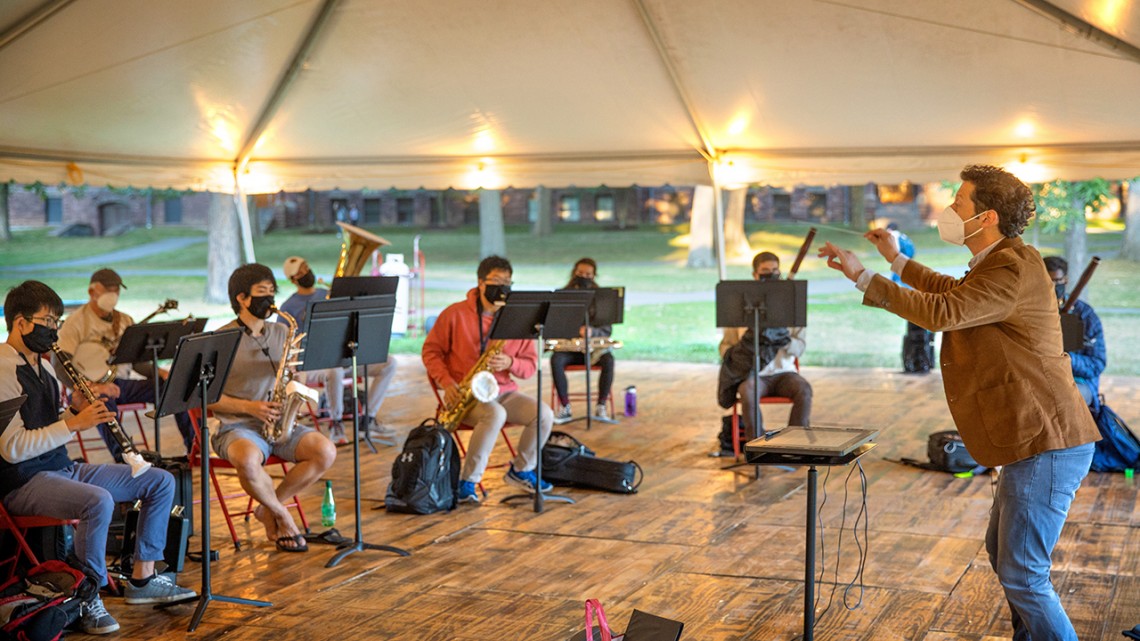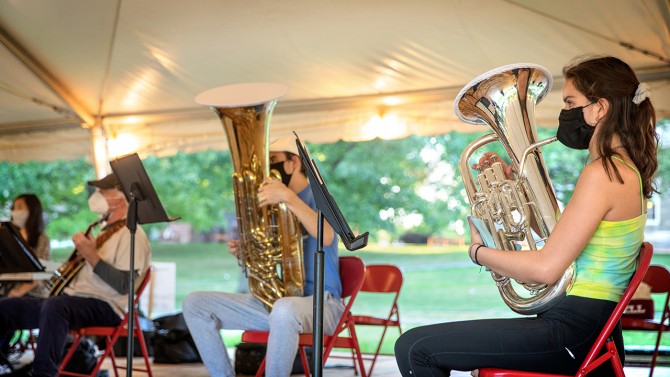
James Spinazzola leads students during rehearsal under a tent on the Arts Quad for his Wind Symphony class.
Music faculty’s pandemic response hitting the right notes
By Kathy Hovis
For faculty members in the Department of Music, a return to campus in the middle of a pandemic made for difficult choices: Would it be possible to create music together while safely socially distancing? Or would they need to devise other ways to help their students make music a part of their lives without being together in large ensembles?
Professors decided on a multitude of creative approaches, including outside rehearsals with smaller groups, new networked inside spaces and an earlier-than-usual outdoor concert.
Others chose to go with Zoom-only meetings and a change in focus.
“I spent the summer constantly thinking of various scenarios and contingencies, and keeping an eye on independent studies focused on wind instrumentalists, singers and aerosol transmission (of the virus),” said James Spinazzola, the Barbara and Richard T. Silver ’50, MD ’53 Assistant Professor and director of Cornell’s wind ensemble program. “What it came down to was that outdoor performance was the only option at this point.”
Walk across the Arts Quad and you’ll see an open-sided tent with a wooden floor, where 36 students can gather safely to rehearse, wearing masks designed for musicians and using covers over the ends of their instruments. The ensemble gave an outdoor concert Oct. 17 for a socially distanced audience.
An additional 15 students are participating online only and making music using a new version of JackTrip opensource software, which was designed from the ground up by Wind Symphony members Alex Coy ’21 and James Parker ’21. JackTrip enables online music-making and addresses the latency problem that exists with most current applications. The app could allow students to play together after the tent closes for the winter.
“My goal was to engage as many students as possible,” Spinazzola said. “If they’re not making music, their skills can disappear so quickly.”
Addressing inequity, racism
For Chris Younghoon Kim, associate professor of music and director of Cornell orchestras, Zoom calls with his students over the summer prompted him to move to an online-only, semesterlong focus on issues of inequity and racism in American orchestras.
In an ongoing Cornell Orchestras Speaker Series, students are hearing from 12 artists, musicians, composers and activists – including Rachel Barton Pine, a violinist advocating for change for more than two decades; and Aaron Dworkin, professor of arts leadership at the University of Michigan and founder of the Sphinx Organization, which addresses the underrepresentation of people of color in classical music.
A.D. White Professor-at-Large Wynton Marsalis, the Pulitzer and Grammy-winning trumpeter, will close out the speaker series Dec. 16. The speaker series is supported by an Engaged Curriculum Grant from the Office of Engagement Initiatives and by Cornell’s student activities fund.
“We are talking about how we can become better musicians and also tackle one of the biggest problems of our generation,” Kim said. “It is not OK to just go back to playing the Western canon of music and the masterworks.”
For students in CU Jazz, Paul Merrill, senior lecturer and the Herbert Gussman Director of Jazz, stretched his skills in sound engineering as he networked numerous practice rooms in Lincoln Hall so that students could play in small groups, but work together.
“We are using tech that is commonly found in large studios, concert halls and theaters and adapted it to meet our unusual needs as a jazz program,” Merrill said. “My Lincoln office now looks like a traditional studio, a place where a rhythm section of piano, bass and drums can perform and record.”
Three more Lincoln Hall rooms were equipped as substudios, with wind performers physically isolated from the other musicians.
“This makes it possible for a trombonist, saxophonist or flautist to participate with little to no danger of aerosol transmission,” Merrill said. “With three pods and one studio, we are able to safely make music with a group of six musicians, a perfect size for a jazz combo.”
The new tech is allowing the student musicians to livestream and record content. CU Jazz plans to release performances on the Cornell Jazz YouTube channel, Cornell Music Facebook page and on the CU Jazz website. A group of jazz musicians also created an original piece for the college’s Oct. 8 reading of “The Bluest Eye,” the debut novel by late alum Toni Morrison, M.A. ’55.
Kathy Hovis is a writer for the College of Arts and Sciences.
Media Contact
Get Cornell news delivered right to your inbox.
Subscribe

